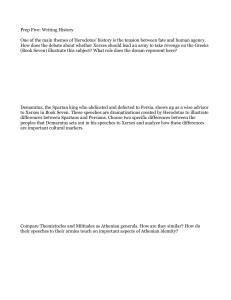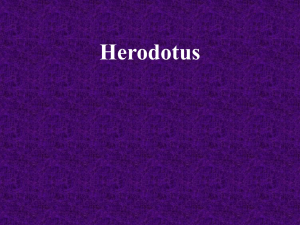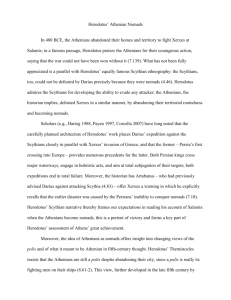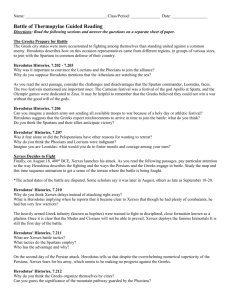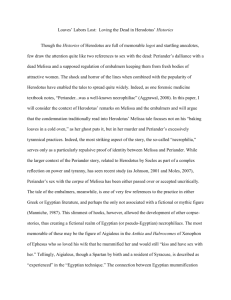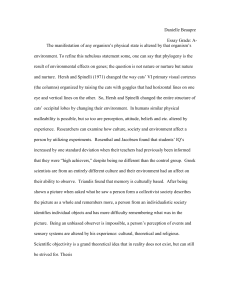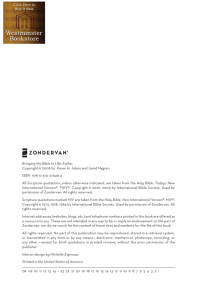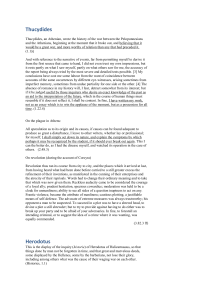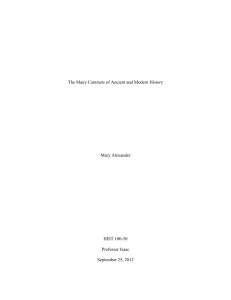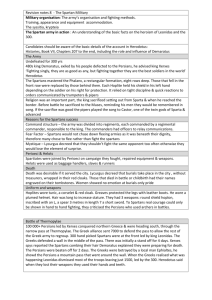Abstract
advertisement
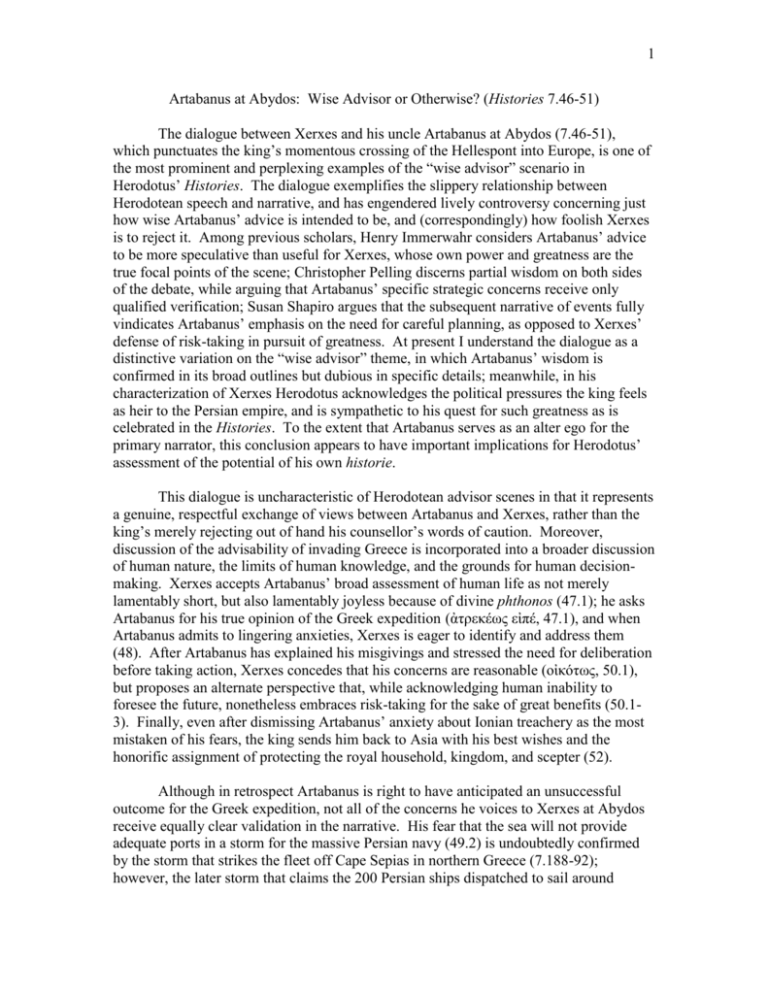
1 Artabanus at Abydos: Wise Advisor or Otherwise? (Histories 7.46-51) The dialogue between Xerxes and his uncle Artabanus at Abydos (7.46-51), which punctuates the king’s momentous crossing of the Hellespont into Europe, is one of the most prominent and perplexing examples of the “wise advisor” scenario in Herodotus’ Histories. The dialogue exemplifies the slippery relationship between Herodotean speech and narrative, and has engendered lively controversy concerning just how wise Artabanus’ advice is intended to be, and (correspondingly) how foolish Xerxes is to reject it. Among previous scholars, Henry Immerwahr considers Artabanus’ advice to be more speculative than useful for Xerxes, whose own power and greatness are the true focal points of the scene; Christopher Pelling discerns partial wisdom on both sides of the debate, while arguing that Artabanus’ specific strategic concerns receive only qualified verification; Susan Shapiro argues that the subsequent narrative of events fully vindicates Artabanus’ emphasis on the need for careful planning, as opposed to Xerxes’ defense of risk-taking in pursuit of greatness. At present I understand the dialogue as a distinctive variation on the “wise advisor” theme, in which Artabanus’ wisdom is confirmed in its broad outlines but dubious in specific details; meanwhile, in his characterization of Xerxes Herodotus acknowledges the political pressures the king feels as heir to the Persian empire, and is sympathetic to his quest for such greatness as is celebrated in the Histories. To the extent that Artabanus serves as an alter ego for the primary narrator, this conclusion appears to have important implications for Herodotus’ assessment of the potential of his own historie. This dialogue is uncharacteristic of Herodotean advisor scenes in that it represents a genuine, respectful exchange of views between Artabanus and Xerxes, rather than the king’s merely rejecting out of hand his counsellor’s words of caution. Moreover, discussion of the advisability of invading Greece is incorporated into a broader discussion of human nature, the limits of human knowledge, and the grounds for human decisionmaking. Xerxes accepts Artabanus’ broad assessment of human life as not merely lamentably short, but also lamentably joyless because of divine phthonos (47.1); he asks Artabanus for his true opinion of the Greek expedition (ἀτρεκέως εἰπέ, 47.1), and when Artabanus admits to lingering anxieties, Xerxes is eager to identify and address them (48). After Artabanus has explained his misgivings and stressed the need for deliberation before taking action, Xerxes concedes that his concerns are reasonable (οἰκότως, 50.1), but proposes an alternate perspective that, while acknowledging human inability to foresee the future, nonetheless embraces risk-taking for the sake of great benefits (50.13). Finally, even after dismissing Artabanus’ anxiety about Ionian treachery as the most mistaken of his fears, the king sends him back to Asia with his best wishes and the honorific assignment of protecting the royal household, kingdom, and scepter (52). Although in retrospect Artabanus is right to have anticipated an unsuccessful outcome for the Greek expedition, not all of the concerns he voices to Xerxes at Abydos receive equally clear validation in the narrative. His fear that the sea will not provide adequate ports in a storm for the massive Persian navy (49.2) is undoubtedly confirmed by the storm that strikes the fleet off Cape Sepias in northern Greece (7.188-92); however, the later storm that claims the 200 Persian ships dispatched to sail around 2 Euboea (8.12-13) is a less close fit. Artabanus’ second fear, of famine generated by increasing distance from reliable sources of supplies, is realized only after the defeat at Salamis, during the Persians’ retreat homeward (8.115). Finally, Artabanus’ most urgent strategic concern, that the king’s Ionian allies might desert to help liberate their mother city Athens (51), appears to be (however reasonable in theory) a false alarm. Even though Themistocles also considers this a possible Persian weakness, his attempts to exploit Ionian patriotism amount to little, as Herodotus notes explicitly in his description of Salamis (8.85). Not until the conclusive battle of Mycale, fought on Asian soil, does Herodotus recognize Ionian desertion as a significant factor in the fighting (9.103). If Artabanus is rightly understood to be one of Herodotus’ narratorial alter egos, this suggests that the author’s own research incorporates wisdom that will enable his readers to foresee future political developments in their broad sweep at least—reflecting, e.g., the instability of human prosperity that is fundamental to Herodotus’ perception of the past. Nonetheless, the human inability to foresee what is certain may hinder more detailed predictions of the future, while the resistance of the powerful to wise counsel may also limit the practical value of historie. Bibliographical Citations Immerwahr, H. (1954) “Historical Action in Herodotus.” TAPA 85: 16-45. Pelling, C. (1991) “Thucydides’ Archidamus and Herodotus’ Artabanus,” in M. Flower and M. Toher, eds., Georgica (London) 120-42. Shapiro, S. (2000) “Proverbial Wisdom in Herodotus.” TAPA 130: 89-118.
